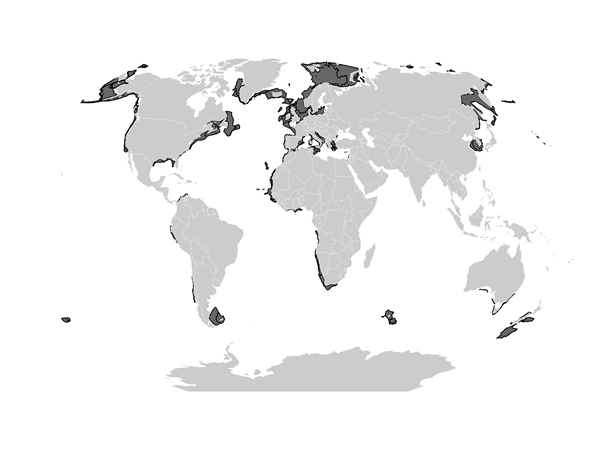Marine fish are rapidly shifting their spatial distributions under climate change across the globe. Building the capacity to track species range shifts is essential for improving the management of impacted resources. How can this be achieved?
Among marine species, demersal fish are one of the main fisheries resources rapidly changing their geographical distributions under climate change. To follow such changes, the existence and availability of good quality scientific surveys is key. Bottom trawl surveys sampling demersal species on continental shelf seas represent one of the best scientific monitoring programs, with large spatio-temporal coverage. We conducted the most exhaustive collection of trawl survey metadata worldwide to date, and found 95 surveys covering no less than 78 Exclusive Economic Zones (EEZs). However, more than half of the samples collected are not publicly available, profoundly limiting our ability to conduct a global assessment of fish distribution changes.

Global map of the survey spatial footprint estimated from the trawl survey metadata (see also: https://rfrelat.shinyapps.io/metabts/)
The unavailability of trawl surveys prevents the accurate assessment of species range shifts, since we find that multiple surveys need to be combined to cover species ranges. Surveys are most of the time conducted regionally or nationally, while many fish species/stocks are transboundary: they are distributed over multiple EEZs. To alleviate these issues, we argue that the visibility, availability of survey data, and the associated expertise need to follow open science principles. Second, to follow accurately changes in species distributions, spatio-temporal modeling should combine multiple surveys and correct for survey discrepancies.
The adaptation of management and policy to climate-induced range shifts in fisheries resources critically depends on the underlying scientific assessment. Enhancing better data sharing and transparent research on transboundary species and stocks can provide better opportunities to establish fair and legally binding management agreements between countries sharing the same shifting resource. This can avoid political conflicts over the shared resource, as well as its overexploitation.
Global data synthesis has the potential to improve our understanding of species biogeography under climate change in under-represented areas, such as in tropical and arctic ecosystems. An accurate and exhaustive assessment of changing stocks and species is essential for the conservation of vulnerable species under climate change.
For more information, please contact Aurore Maureaud: aurore.maureaud@yale.edu
Maureaud A,Frelat R, Pecuchet L, Shackell N, Mérigot B, Pinsky ML, Amador A, Anderson SC, Arkhipkin A, Auber A, Barri I, Bell RJ, Belmaker J, Beukhof E, Camara ML, Guevara-Carrasco R, Choi J, Christensen HT, Conner J, Cubillos LA, Diadhiou HD, Edelist D, Emblemsvåg M, Ernst B, Fairweather TP, Fock HO, Friedland KD, Garcia CB, Gascuel D, Gislason H, Goren M, Guitton J, Jouffre D, Hattab T, Hidalgo M, Kathena JN, Knuckey I, Kidé SO, Koen-Alonso M, Koopman M, Kulik V, León JP, Levitt-Barmats Y, Lindegren M, Llope M, Massiot-Granier F, Masski H, McLean M, Meissa B, Mérillet L, Mihneva V, Nunoo FKE, O'Driscoll R, O'Leary C, Petrova E, Ramos JE, Refes W, Román-Marcote E, Siegstad H, Sobrino I, Sólmundsson J, Sonin O, Spies I, Steingrund P, Stephenson F, Stern N, Tserkova F, Tserpes G, Tzanatos E, van Rijn I, van Zwieten P, Vasilakopoulos P, Yepsen DV, Ziegler P, Thorson J. (in press) Are we ready to track climate-driven changes in marine species across international boundaries? – A global survey of scientific bottom trawl data. Opinion, Global Change Biology
Access to the publication: https://onlinelibrary.wiley.com/journal/13652486
Header image credit: Svanhildur Egilsdóttir, Marine and Freshwater Research Institute, Iceland.